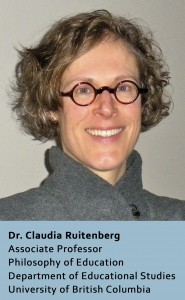Dr. Claudia Ruitenberg
Topic: A philosopher walks into a Centre for Health Education Scholarship…
Date: Wednesday, June 19th, 2013
Time: 12:00pm to 1:30pm (Lunch will be served at DHCC)
Locations:
- Diamond Health Care Centre 1020 (Host site)
- LSC 1312
- MSB 107
- RJH 120
- KGH 235
- NHSC 9-374
- Alouette Room at Central City
Abstract
It may sound like the beginning of a bad joke, but in the fall of 2012 a philosopher did walk into CHES. What did she notice? This presentation will address philosophical themes pertinent to medical education scholarship that emerged from a one-semester engagement with CHES as “philosopher-inresidence.” The purpose of the residency was to see what philosophy of education might contribute to medical education scholarship, and what philosophers of education might learn by paying attention to medical education. In reading medical education literature, attending presentations, and having more than twenty conversations with scholars, clinical educator fellows and others at CHES, some topics were noticeably present, others markedly absent. For example, what could be the place of theories of curriculum and pedagogy in addition to theories of learning and assessment in medical education scholarship? How might critical thinking be different from clinical reasoning, and should it be taught in medical education? And why was there so much talk of professionalism but so little of ethics?
Biography
Dr. Claudia Ruitenberg is Associate Professor of Philosophy of Education in the Department of Educational Studies at UBC. She makes use of philosophical perspectives in especially the areas of language, ethics, and politics to understand educational practices and phenomena such as censorship in education, professionalism in teaching, and citizenship education. She is editor of What Do Philosophers of Education Do? (And How Do They Do It?) (Wiley-Blackwell, 2010) and co-editor (with D.C. Phillips) of Education, Culture and Epistemological Diversity: Mapping a Disputed Terrain (Springer, 2012). Her publications have appeared in, among others, the Journal of Philosophy of Education, Studies in Philosophy and Education, Educational Philosophy and Theory, and the Philosophy of Education Yearbooks. From September to December 2012 she was “philosopher-of-education-in-residence” at CHES, with the purpose of examining what philosophical perspectives and questions might contribute to medical education, and what questions the particularities of medical education might raise for the field of philosophy of education. More information can be found at http://edst.educ.ubc.ca/facultystaff/claudia-w-ruitenberg
Accreditation:
As an organization accredited to sponsor continuing medical education for physicians by the Committee on Accreditation of Canadian Medical Schools (CACMS), the UBC Division of Continuing Professional Development designates this educational program as meeting the accreditation criteria of the College of Family Physicians of Canada for up to 1.5 Mainpro-M1 credits (per session). This program has been reviewed and approved by UBC Division of Continuing Professional Development. Each physician should claim only those credits he/she actually spent in the activity.
Accreditation Statement:
The CHES Research Rounds is a self-approved group learning activity (Section 1) as defined by the Maintenance of Certification program of the Royal College of Physicians and Surgeons of Canada.

